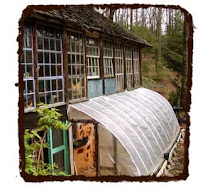We have recently updated our website, and now are hosting our blog here:
http://mountaingardensherbs.com/index.php/blog/
You can find information on plant sales, workshops, and regular updates on our new blog!
Wednesday, May 23, 2012
Tuesday, May 8, 2012
Weekend at the Asheville Herb Festival
We had a lot of fun this weekend at the Asheville Herb Festival! We sold quite a few plants, and bought and traded for many others, including tea, curry, and Vietnamese Cilantro plants. It's great to meet and connect with other herb growers, and to learn what customers want to grow.
For more information on the herb festival: http://ashevilleherbfestival.com/
For more information on the herb festival: http://ashevilleherbfestival.com/
 |
| Becca amidst the many plants we labelled for the sale. |
 |
| By Sunday, our booth was emptying out! |
 |
| A rare shot of me, Kate, Mountain Gardens Intern/Blogger. |
Swarming bees
Bee colonies will, if healthy, sooner or later outgrow their hive.
Beekeepers can accommodate their bees by adding supers, or extra levels to the bee hive boxes. Another option is to split hives. To split a hive, the queen is placed in a new hive, along with workers, some of her brood, and honey. If the split is successful, a new queen will hatch from one of several special queen egg cells.
In nature, bees will swarm from a hive and congregate in a high place, such as a tree, while scouts look for an appropriate new home.
Our bees recently swarmed, in spite of our best efforts to keep them happy at home.
Luckily, we were able to catch most of the swarm, and set them up in a new hive! And, no one was stung in the process.
Beekeepers can accommodate their bees by adding supers, or extra levels to the bee hive boxes. Another option is to split hives. To split a hive, the queen is placed in a new hive, along with workers, some of her brood, and honey. If the split is successful, a new queen will hatch from one of several special queen egg cells.
In nature, bees will swarm from a hive and congregate in a high place, such as a tree, while scouts look for an appropriate new home.
Our bees recently swarmed, in spite of our best efforts to keep them happy at home.
Luckily, we were able to catch most of the swarm, and set them up in a new hive! And, no one was stung in the process.
 |
| Ryan and Sean collect the swarm from the top of a tree. |
 |
| Just a few of the bees |
Spring Ephemerals
As the name of this category of edibles
implies, they appear and are available for consumption for only a
brief period of time. Solomon's seal shoots are tender and similar
to asparagus, until the plants grow too tall to eat. The leaves of
ramps (wild leeks) are only visible for a few months, before the
leaves die back--though the plant later sends up a flowr. The morel mushroom season lasts a couple of months,
with the morels only appearing after a big rain when the weather is
just right.
Here at Mountain Gardens we have been delighting in harvesting these spring ephemerals, and collecting them for a few local restaurants as well.
A few favorite dishes:
Local farm-fresh eggs stir-fried with bamboo shoots,
fiddlehead ferns, nettle leaves, and ramps
Nettle pesto with ramps, fiddleheads, and Solomon's Seal
Morels sauteed in butter
Rabbit stew
Nettle pesto with ramps, fiddleheads, and Solomon's Seal
Morels sauteed in butter
Rabbit stew
These spring wild foods are growing in
popularity. Nettle pesto was recently highlighted as a delicacy on
an NPR culinary radio program. The Mountain Express, Asheville's
weekly newspaper, devoted several articles in April to ramps. Like American ginseng, ramps are threatened due to
over-harvesting. In Yancey County, it is possible to drive down the
highway and see men selling large bunches of ramps for $2 from the hoods of their cars. Ramps are
a prized traditional local delicacy, often the first harbinger of
spring. If ramps are pulled out with the roots, however, the plants
are killed. We harvest them sustainably, leaving the roots intact so
that the plant remains. It can take a ramp plant up to seven years
to create seeds, since they grow so briefly each year. We are
growing ramps and other native forest plants here at Mountain Gardens
to help preserve some of these plants and to encourage their
cultivation. We have native edible and medicinal plants that we sell in our nursery (check our
website for availability http://www.mountaingardensherbs.com/).
 |
| Gourmet dinner: hasta shoots, morel mushrooms, Solomon's seal shoots, and ramps |
 |
| Gourmet again featuring giant dryad saddle mushroom, Solomon's seal, ramps, and magenta Lamb's quarters |
 |
| Giant morel! |
 |
| Ryan using special stingless nettle harvesters (designed by Joe Hollis) |
Subscribe to:
Comments (Atom)


